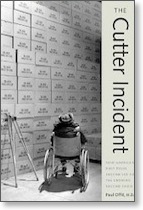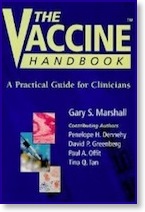
Paul A. Offit, MD
Fellow
Philadelphia, Pennsylvania, USA
Paul A. Offit, MD, is a pediatrician and leading expert in vaccines, immunology, and virology. He is well known for defending the scientific position on the benefits and critical need for immunization against the “anti-vax movement” – a movement that believes, contrary to overwhelming evidence of vaccine safety, that vaccines cause autism and other serious conditions.
Dr Offit worked 25 years, along with his colleagues Fred Clark and Stanley Plotkin, to invent a rotavirus vaccine (RotaTeq) against a form of gastroenteritis which has been estimated to kill up to 600,000 of the world’s children every year. (The Centers for Disease Control now recommends RotaTeq for universal use in infants.)
Dr Offit has published more than 130 papers in medical and scientific journals in the areas of rotavirus-specific immune responses and vaccine safety. He has also published a number of popular books about immunization and the threats to public health posed by the anti-vax movement, most recently Deadly Choices (2010) and Autism’s False Prophets (2008; q.v.; he has donated all royalties from this book to autism research). In return for his public advocacy for childhood immunization, Dr Offit and his family have received numerous threats of violence.
As a member of a CDC panel during a threat of bioterrorism, Dr Offit was the only person to advise against a program to vaccinate thousands of Americans against smallpox. He made several television appearances, arguing that the risk of the proposed vaccination program outweighed the risk of individuals contracting the disease.
Dr Offit is the Chief of the Division of Infectious Diseases and the Director of the Vaccine Education Center at the Children’s Hospital of Philadelphia. He is also Maurice R. Hilleman Professor of Vaccinology, and a Professor of Pediatrics, at the University of Pennsylvania School of Medicine. He has also been a member of the Advisory Committee on Immunization Practices to the Centers for Disease Control and Prevention
Dr Offit received his medical degree from the University of Maryland, Baltimore. At Children's Hospital of Philadelpha, Dr Offit studied with Maurice Hilleman, who was responsible for making nine of the 14 vaccines routinely given to children today, and hailed as the greatest developer of vaccines in the 20th century. Dr Offit wrote a book about his mentor, Vaccinated: One Man's Quest to Defeat the World's Deadliest Diseases (2007).
Selected Books:
Deadly Choices: How the Anti-Vaccine Movement Threatens Us All (Basic Books, 2010). There’s a silent, dangerous war going on out there. On one side are parents, bombarded with stories about the dangers of vaccines, now wary of immunizing their sons and daughters. On the other side are doctors, scared to send kids out of their offices vulnerable to illnesses like whooping cough and measles — the diseases of their grandparents. How did anyone come to view vaccines with horror? The answer is rooted in one of the most powerful citizen activist movements in our nation’s history. In Deadly Choices, infectious disease expert Paul Offit relates the shocking story of anti-vaccine America — its origins, leaders, influences, and impact. Offering strategies to keep us from returning to an era when children routinely died from infections, Deadly Choices is a vigorous and definitive rebuttal of the powerful anti-vaccine movement.
Autism’s False Prophets: Bad Science, Risky Medicine, and the Search for a Cure (Columbia University Press, 2008). [entry in Wikipedia] Attempting to answer the enormous frustration and unhappiness of parents “tired of watching their autistic children improve at rates so slow it’s hard to tell if they are improving at all,” Dr Offit explores purported causes and cures. Examining false approaches like facilitated communication (“a massive, nationwide delusion”) and secretin injections (“no better than salt water”), and mistaken theories of origin (the MMR vaccine, thimerosal), the book urges journalists to resist the lure of “dramatic headlines, advertising dollars, and ratings” rather than report an unconfirmed or untrustworthy study. The only worthwhile studies, Dr Offit purports, are those meeting three criteria: “transparency of the funding source, internal consistency of the data, and reproducibility of the findings.”
Vaccinated: One Man's Quest to Defeat the World’s Deadliest Diseases (Smithsonian Books/Collins, 2007). [review in The Lancet] Maurice Hilleman’s name isn’t widely known, and this biography asserts that fact is both a shame and a blessing. It’s a shame because the outspoken, brilliant, yet humble scientist from Montana invented vaccines that all but wiped out a number of infectious diseases. Thanks to his genius, such diseases as mumps, rubella, measles, and hepatitis A and B no longer claim millions of lives, mostly children’s. He merits greater recognition. But his obscurity is also a blessing because it prevents more people from using his name in vain, for Hilleman's vaccines have recently become increasingly controversial and their efficacy clouded by questions about adverse side effects. Still, Dr Offit tries to pull no punches in defending Hilleman against those who would crucify him for combining measles, mumps, and rubella vaccines into one shot and for the choice to add thimerosal to extend the shelf life of all vaccines. The book is an examination of the kind of single-minded determination it takes to tackle diseases that threaten the world’s children. And to do so without bravado—no vaccine bears Hilleman's name, no awards his mantle—is to define what it is to be simply heroic.
The Cutter Incident: How America's First Polio Vaccine Led to the Growing Vaccine Crisis (Yale University Press, 2005). After a wave of books celebrating the 50th anniversary of Jonas Salk’s polio vaccine, this account is the first to focus on a largely forgotten aspect—one with negative repercussions 50 years later. With a nuanced examination of a complex story, this book relates how Cutter Laboratories, one of several pharmaceutical companies licensed to produce Salk’s killed-virus vaccine, shipped many lots of vaccine containing live virus, creating a mini polio epidemic: 40,000 children became ill, 200 were permanently paralyzed, 10 died. The examination centers on how Cutter was and was not responsible: tests for detecting live virus at the time were simply not sensitive enough, but Cutter departed from Salk’s safe production protocols. And while the company knew there was a problem, it failed to notify the government’s oversight agency. Cutter faced costly lawsuits that have led to present vaccine crises: shortages due to pharmaceutical companies’ unwillingness to risk testing and producing vaccines and face possible litigation. In another example of the law of unintended consequences, the book reveals how "the Cutter Incident" led Salk’s vaccine to be replaced by a less safe one: Sabin’s live-virus vaccine.
Vaccines: What You Should Know, with Louis M. Bell (Wiley, 3rd edn., 2003). This book helps consumers sort through the latest information about vaccines in order to determine what is right for the family. This guide presents straight-forward facts about what vaccines are made of and clearly explains how they are made, how they work, and the risks associated with them. This updated edition includes recommendations for the smallpox vaccine, the latest information on vaccines for travelers, and the latest on the progress of combination vaccines. Expanded information on vaccine safety includes discussion of vaccines and autism, mercury in vaccines, and the ability of children to tolerate numerous vaccines at once.
The Vaccine Handbook: A Practical Guide for Clinicians, with Gary S. Marshall, Penelope H. Dennehy, David P. Greenberg, and Tina Q. Tan (Lippincott Williams & Wilkins, 2003). This handbook offers practical, up-to-date guidelines on proper use of vaccines and helps clinicians answer the many questions asked by patients and parents. Chapters describe in detail all vaccines currently recommended for infants and children, travelers, and individuals in special circumstances. For each vaccine, the authors discuss the disease and its epidemiology, the vaccine’s efficacy and safety, and the practical questions most frequently asked about the vaccine’s use. An extensive chapter addresses specific parental concerns about vaccines and their safety. The authors also discuss problems such as allergies, breastfeeding, dosing intervals and missed vaccines, and immunocompromised individuals.
Breaking the Antibiotic Habit: A Parent's Guide to Coughs, Colds, Ear Infections, and Sore Throats, with Bonnie Fass-Offit and Louis M. Bell (Wiley, 1999). Overuse of antibiotics has led to antibiotic-resistant strains of bacteria, or “superbugs.” Antibiotics are increasingly ineffective because they are often prescribed inappropriately to treat viral infections, such as colds, bronchitis, and sore throats. Natural supplements may offer more relief. The book covers key issues about this choice, including: distinguishing between strep throat and sore throat, sinus infection and the common cold, pneumonia and bronchitis, and ear infections and ear fluids; helping children with viral infections feel better—without antibiotics; getting the most from over-the-counter remedies and natural supplements—which are best for specific symptoms, and which to avoid altogether.
Selected Articles:
- “Nothing to fear but the flu itself,” The New York Times, 2009 Oct 11.
- “Vaccines and autism: a tale of shifting hypotheses” (with JS Gerber), Clinical Infectious Diseases, 2009 Feb 15; 48(4):456–461. [DOI]
- “The problem with Dr Bob’s alternative vaccine schedule,” Pediatrics, 2009 Jan 1; 123(1): E164–169. [DOI]
- “Vaccines and autism revisited — the Hannah Poling Case,” The New England Journal of Medicine, 2008 May 15; 358(20):2089-2091. [DOI]
- “Inoculated against facts,” The New York Times, 2008 Mar 31.
- “Vaccine expert Paul Offit, M.D., counters anti-vaccine message portrayed in ABC’s ‘Eli Stone’ premiere,” press release, 2008 Jan 31.
- “Sick propaganda,” Wall Street Journal, 2007 Jun 12.
- “The risk of being risk averse,” Philadelphia Inquirer, 2007 Jun 12.
- “The omnibus autism hearing,” Boston Globe, 2007 Jun 3.
- “At risk: vaccines: how a legal case could cripple one of modern medicine's greatest achievements,” The Boston Globe, 2007 Jun 3.
- “Addressing parents’ concerns: do vaccines contain harmful preservatives, adjuvants, additives, or residuals?” Pediatrics, 2003 Dec; 112(6):1394-1397 [abstract]; discussion [epub only].
- “Infant’s immune system? Addressing parents’ concerns: do multiple vaccines overwhelm or weaken the infant’s immune system?” (with J Quarles, MA Gerber, CJ Hackett, EK Marcuse, TR Kollman, BG Gellin & S Landry), Pediatrics, 2002 Jan 1; 109(1):124-129. [DOI]
- “Thimerosal and autism,” Colorado Department of Health and Environment.
Testimony:
- Dr Paul Offit’s testimony to the House Government Reform Committee, 2000 Apr 6. The testimony addressed the question: does the MMR vaccine cause autism?
Listen to Paul Offit:
- “Paul Offit – the costs of vaccine denialism,” Point of Inquiry, 2010 Feb 12.
- “Doctor punctures H1N1 vaccine fears,” Talk of the Nation, NPR, 2009 Oct 12.
- “Childhood vaccinations,” interview by Ira Flatow, Science Friday, NPR, 2008 Aug 29.
- “Parents protest increase in required vaccinations,” Talk of the Nation, NPR, 2008 Aug 29.
- “Maurice Hilleman: his extraordinary life and work,” National Immunization Conference, 2006 Mar 6.
Watch Paul Offit:
- Paul Offit interviewed by Stephen Colbert, The Colbert Report, 31 Jan 2011.
- “Autism and the MMR vaccine, revisited,” Medscape, 2011 Jan 7.
- On the Vaccinate Your Baby website
- “Dealing with parents who want to delay, withhold, or space out vaccinations,” Medscape Today, 2010 Jul 7.
- “Vaccine acceptance,” School of Public Health, Albany, 2009 Oct 15.
- “The vaccine war,” Frontline, PBS, 2010 Apr 27:
- Dateline, NBC, 2009 Sep 9:
In the News:
- “Journal Club debunks anti-vaccine myths,” by Harriet Hall, Science-Based Medicine, 2010 Nov 2.
- “The anti-vaccine movement strikes back against Dr. Paul Offit,” by David Gorski, Science-Based Medicine, 2010 Jan 4.
“An epidemic of fear: how panicked parents skipping shots endangers us all,” by Amy Wallace, Wired, 2009 Oct 19.
- “Vaccines and the media: no room for balance,” by John Snyder, Science-Based Medicine, 2010 Sep 2.
- “Vaccines and autism: many hypotheses, but no correlation,” Clinical Infectious Diseases, 2009 Jan 30.
- “Alternative vaccine schedule stirs debate,” by Bill Hendrick, WebMD, 2008 Dec 29.
- “Inside the vaccine-and-autism scare,” by Rahulk K. Parikh, Salon, 2008 Sep 22.
- “Stomping through a medical minefield,” by Claudia Kalb, Newsweek, 2008 Oct 25. [video]
- “Vaccine-autism question divides parents, scientists,” by David S. Martin, CNN, 2008 Apr 2.
- “Mercury-containing vaccine safe,” interview, Insidermedicine, 2007 Sep 26.
- “Paul Offit on how we could lose the modern medical marvel of vaccines,” Breath Spa for Kids, 2007 Jun 24.
Selected Awards:
- 2011 Biotech Humanitarian Award [podcast]
- J. Edmund Bradley Prize for Excellence in Pediatrics, University of Maryland Medical School
- Young Investigator Award in Vaccine Development from the Infectious Diseases Society of America
- Research Career Development Award from the National Institutes of Health
- Gold Medal from the Children’s Hospital of Philadelphia
- Jonas Salk Medal from the Association for Professionals in Infection Control and Epidemiology
The Online Paul Offit:

















